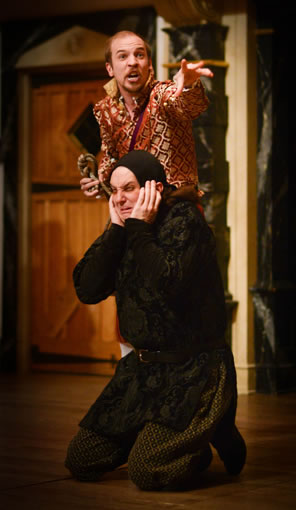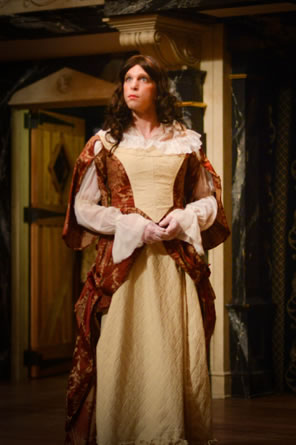Epicene, or the Silent Woman
Second Banana Slips on His Own Cleverness
By Ben Jonson
American Shakespeare Center, Blackfriars Playhouse, Staunton, Va.
Saturday, March 15, 2014, C–6&7 (front middle stalls)
Actors' Renaissance Season

Truewit (Tim Sailer) and Morose (John Harrell) in Epicene, or the Silent Woman at the Blackfriars Playhouse. Photo courtesy of the American Shakespeare Center.
Jonson and Shakespeare, two names that pair up like the Beatles and the Stones, like Lucas and Spielberg: giants of their genre's times, rivals yet friends, competitors and collaborators. I've heard it said that if not for Shakespeare, Jonson would be considered England's national poet, a sentiment Jonson himself certainly contended (though he would have left off the "if not for Shakespeare" qualification). A theater company specializing in Shakespeare and early modern classics, such as the American Shakespeare Center at the replica Blackfriars Playhouse, would perforce make Jonson a significant contributor to its repertoire.
Such a theater company also makes Middleton, Fletcher, Beaumont, Wycherley, Massenger, and, of course, Marlowe significant contributors to its repertoire, too. Increased exposure to these other Shakespeare contemporaries in the hands of actors with verse-speaking expertise playing in theater conditions akin to what those playwrights specifically wrote for makes one desire any and all opportunities to see any and all Jonson here.
Epicene, or the Silent Woman might cure one of that desire. What a weird play, and I don't mean that in an acid trip kind of way. Jonson is downright Mozartian in the way he layers motifs upon motifs upon motifs, which is clever, but as Jonson's motif of choice is jests, it gets confoundedly frustrating. This guy is punking these guys while everybody is punking this guy and another guy is punking everybody else, and the whole thing lands on a single insider theater joke for its ultimate punch line.
All these pranks are meant to seem like justice expended on the deserving, but it comes off as merely mean. Nobody in this play is particularly attractive as Jonson in his sledgehammer way draws caricatures instead of characters with names like Morose, Dauphine Eugenie, Truewit, Amorous La Foole, Mr. and Mistress Otter (neither fish nor beast, a joke stolen from Shakespeare's Falstaff), Madame Haughty, Madame Centaure, Mistress Trusty, and Cutbeard who is, wait for it, a barber.
Epicene was first performed by the Children of the Queens' Revels, a boys company operating at the Whitefriars Theatre; it flopped in its 1609 debut, and for obvious reasons that require a spoiler alert (click here). Notably, the actors in this production—who, under the conditions of the Actors' Renaissance Season, mount plays using only cue scripts and relying on just a few days of rehearsal without a director or production team—dress themselves in formal Elizabethan clothes from the theater's costume stock. It's the most suitable choice for a script that seems particularly dated, from its characters and its environment to its sensibilities—so dated that two topical references sound like actor insertions but actually are in the script. Morose lists what he considers particularly alien locales as "Constantinople, Ireland, or Virginia" (Jonson's joke is lumping Ireland with the other two), and Otter, in describing his wife, says, "All her teeth were made in the Black-Friars, both her eyebrows in the Strand, and her hair in Silver-street" (Jonson is using the reference as a stab at his rival company, the King's Men, and its new indoor theater).
Jonson earns much modern criticism for the misogyny running rampant through his plays, and he ramps it up for Epicene. However, this misogyny comes from the mouths of pretty despicable people, and, let's face it, what everybody in this play regards as a model woman turns out to be a joke. Plus, I have to admit, Otter's description of his wife is hilarious: "Every part of the town owns a piece of her. She takes herself asunder still when she goes to bed, into some twenty boxes; and about next day noon is put together again, like a great German clock." Poor Otter, though, for even as he's saying this he's the victim of a prank by his so-called friends who have brought in Mistress Otter expressly to overhear him.
All that said, the Blackfriars audience laughed and laughed and laughed, and I give credit to this company of actors (if Jonson had such a company at his Whitefriars, his initial offering of Epicene might not have been such a dud). Take René Thornton Jr. as the gregarious innkeeper Otter with his Bull, Bear, and Horse, the names he gives his favorite glasses: being his own prop master, Thornton brings Jonson's obtuse joke to fruition by keeping in a special holster souvenir glasses for the Chicago Bulls, Chicago Bears, and Denver Broncos. This actor who carries a commanding presence in all his Blackfriars roles transforms into a giant, plush toy-like Otter, whether he's serving his upper-class customers or placating his shrewish wife, who is played with both regal bearing and firestorm intensity by Tracie Thomason (she and Thornton work out a wonderful, acrobatic wrestling bout when she attacks him for his German clock comment).
For a play with a theater-company-specific joke as a punch line, this production does something of the sort in casting resident loudmouth clown Allison Glenzer as Mute, servant to Morose, a man who can brook no noise. Glenzer's Mute walks through the house with pillows duct-taped to her feet and answers her master's inquiries with a semi-dainty bow of her leg (Glenzer also plays a sassy Madame Haughty, president of the lady collegiates who gather for alleged academic pursuits, but Jonson clearly intimates they are really seeking sexual pleasures from various courtiers and other boy toys). John Harrell is Morose, not just fitting the description of him as wearing "a huge turban of night-caps on his head, buckled over his ears," but supplementing his black pajama-like costume with dark shadows under his eyes, a Marley's ghost roaming this loud earth in perpetual irritation. Aside from shunning all noise, he has some unclear dislike for his nephew Dauphine Eugenie (Andrew Goldwasser), whom he intends to disinherit by seeking marriage with a soft-spoken woman of means, if any such creature could even exist (I'm echoing Jonson's sentiment here). While Truewit (Tim Sailer) openly schemes to infect Morose with an overabundance of noise in his home, Eugenie schemes to somehow circumvent his uncle's marriage and get back into the line of inheritance.

Gregory Jon Phelps as the title character in the American Shakespeare Center's production of the Ben Jonson play Epicene, or the Silent Woman at the Blackfriars Playhouse. Photo courtesy of the American Shakespeare Center.
Truewit along with his friend Clerimont (Jonathan Holtzman) are not only the master jest makers but also serve as in-plot choruses, describing all the characters in most contemptible terms as they plan out their next pranks upon them. The characters then enter as advertised. Chris Johnston is Amorous La Foole (at the risk of being typecast, Johnston is cornering the market on playing foppish fools). He comes on in fur-trimmed cape, leather-like pants, and a red-ribboned starburst of a codpiece, which gets its full due every time he sits and spreads his legs in a conscious effort at appearing sexy. Josh Innerst is unrecognizable as the braggart knight John Daw, namedropping his way to seeming intellectualism (prompting a nice anti-intellectualism joke when Daw who, in yet another prank, has acquiesced to being kicked six times: "What's six kicks to a man that reads Seneca?" Truewit remarks).
Gregory Jon Phelps, meanwhile, is recognizable as the title character, Epicene, the soft-spoken woman Morose ends up marrying. He scores laughs with every line because his replies to Morose are so barely audible until they are married, at which point Epicene becomes entirely too voluble for her new husband who immediately sets out to divorce her.
To say Phelps is recognizable in woman's wig and Elizabethan dress is not to say he is obviously not a woman in the role; not only is Phelps a most attractive lady, he plays the part sublimely. ASC should seriously consider casting him as Beatrice, Viola, Olivia, or other such Shakespearean heroines. With this role, Phelps lays down a hand of four aces for this Actors' Renaissance Season: a sweetly baffled but ever-heroic Orlando in As You Like It, the accidently clever, in-the-moment Truffaldino in The Servant of Two Masters, and the psychologically abused courtier Amintor in The Maid's Tragedy (not to mention a variety of ensemble roles in Timon of Athens).
In such a lineup of plays—including Shakespeare's generally denigrated Timon—Jonson's Epicene pales; but this company of actors never does, turning Jonson's dud into a lot of fun.
Eric Minton
March 19, 2014
Comment: e-mail editorial@shakespeareances.com
Start a discussion in the Bardroom



 Find additional Shakespeareances
Find additional Shakespeareances